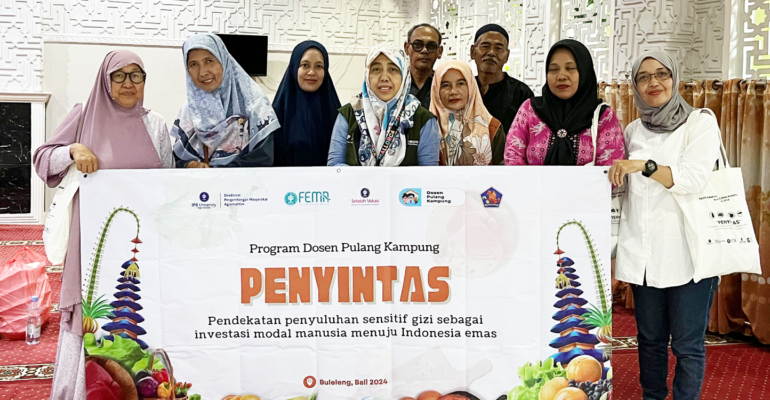IPB University’s Homecoming Lecturer Team Launches PENYINTAS Innovation

The Central Bureau of Statistics (BPS) projects that Indonesia’s population is estimated to reach 328.93 million people. The increasing population can have an impact on limited resources, such as poverty, food, health, and environmental problems.
In connection with the above, in addition to education and research, universities have an important role through community service. IPB University’s Pulang Kampung Lecturer Programme (Dospulkam) is one of the realisations of community service coordinated through the Directorate of AgroMaritime Community Development (DPMA).
The Dospulkam team led by Dr Siti Amanah, Lecturer of the Faculty of Human Ecology (Fema) brought the innovation of PENYINTAS (Nutrition Sensitive Extension Approach as Human Capital Investment towards Golden Indonesia) by conducting a kick-off meeting with partners of the Family Welfare Program (PKK) Movement Team of Kampung Kajanan Village, Buleleng Regency, Bali.
The Dospulkam “PENYINTAS” team was supported by three Fema lecturers, one IPB University Vocational School lecturer and five multidisciplinary students from the Department of Science Communication Community Development (SKPM), and one support staff.
“One of the emerging perspectives related to nutrition-sensitive extension approaches is sustainable production and consumption. We emphasise that the PKK Team plays an important role as a Self-Help Extension Worker in assisting behavioural transformation towards a better direction in implementing the ten main PKK Programmes that greatly support the achievement of development goals,” said Dr Siti.
She stated that through the implementation of proper extension according to the principles of continuing education, it can encourage behavioural transformation of individuals, groups and communities in food production and consumption.
“We want to remind the importance of adopting a healthy lifestyle. Consumption of diverse, nutritionally balanced and safe (B2SA) food is relatively easy to implement because Indonesia is rich in local food sources with high nutritional value. However, it takes real will and effort to start living a healthy life physically and mentally,” she said.
Dr Siti also said that the implementation of “PENYINTAS” requires synergy and multi-stakeholder cooperation, including support from the Government, community participation, and support from business and industry.
“I hope the PKK team and local extension workers have a big role in educating and assisting the community, especially the Women Farmers Group (KWT) in producing healthy and safe food,” she said. (*/Lp) (IAAS/RSL)



